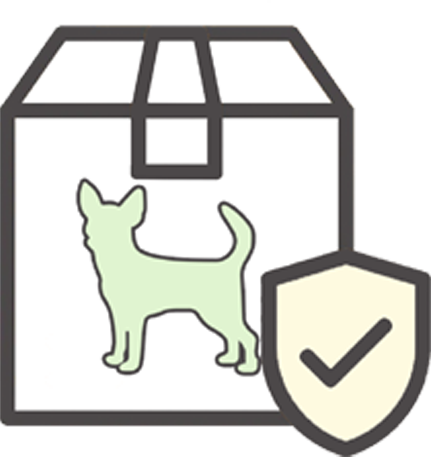Ruff Day? Recognizing Signs of Stress in Dogs
Updated On: Friday, November 15, 2024 11:13:14 AM America/Los_Angeles
Every dog has a ruff day–even the most loved and best cared for fur babies. Separation anxiety, routine changes, boredom, and illness are just a few of the reasons that canines may experience stress. While stress isn’t entirely unavoidable, dog pawrents can learn about common signs of stress and how to remedy them to get their fur baby happy and healthy again.
Photo by Matthew Henry
Destructive Behavior
Destructive behavior is one of the most noticeable signs of stress. It’s commonly associated with separation anxiety, but it could be a sign of boredom as well. For dogs, boredom has less to do with having fun and more to do with not having enough mental stimulation. Whatever the cause, an interactive toy can go a long way in providing some relief for doggos who are engaging in destructive behavior as a response to stress.
Frequent Urination
Sudden potty accidents? Peeing more than usual? Your furry one just might be feeling stressed or anxious. Make extra pet potties available around the home until the stressor is eliminated. A real grass pee pad like DoggieLawn can offer a bit of the great outdoors when you’re away from home and a peace of mind for you.
Upset Tummy
Diarrhea is probably the first thing that comes to mind when thinking about stress’s effects on the tummy. However, that isn’t always the case. Other effects include any changes in regular potty habits such as diarrhea, constipation, bloating, and indigestion. If symptoms persist, consult your vet to check and see if there’s a larger problem behind the gastrointestinal upsets. Until then, keep mealtimes as consistent as possible.
Loss of Appetite
It’s not surprising that stress, which can cause tummy issues, can also lead dogs to refuse food. Dogs are likely to decline their meals if they’re feeling any discomfort or pain due to stomach problems. Another reason behind loss of appetite can also be depression or anxiety, which in turn reduces their appetite. A loss of appetite can indicate an underlying issue, so it’s always a good idea to check with a professional. Plus, longstanding anorexia can result in nutrition deficiencies that lead to further complications. A vet will be able to inform you of how to best supplement your pup’s diet if needed.
Yawning
While the cause of yawns is still a mystery, it’s a well-known fact that yawns can be contagious. Dogs also have intuitive awareness of this and utilize it to their advantage. Yawning as a symptom of stress is commonly used in social situations when there are other animals or humans around. It is believed that canines use yawning to calm themselves and others. For instance, if a pooch yawns while you run into a friend, it may signal that they’re either uncomfortable with the person or the situation. Luckily, yawning is generally a response to temporary situations–nothing a tasty calming treat can’t relieve!
Excessive Grooming or Licking
Hot spots or irritated skin can indicate that dogs have been overgrooming. Since allergies or pests can also lead to excessive grooming, it’s a good idea to treat those issues (e.g. by putting your pooch on flea meds) while also treating damaged skin. Appropriate alternatives to address excessive grooming can include chew toys and lick mats.
Curious about what’s behind your dog’s stress? Check out more common causes here. You might even be surprised to find out that your own stress is the root of your fur baby’s stress! If you’re feeling stumped about what’s behind irregular behaviors, a vet can always help figure out what the underlying cause might be.

